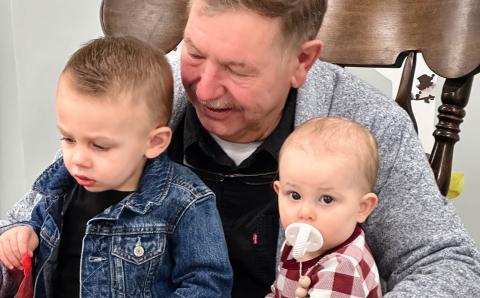I have a control issue. By God’s grace I am better at keeping it in check now, but I still struggle with the desire to be in control. By this I do not mean “bossing people around.” It is much more subtle than that. It is about spiritual control.
For years, I was not aware of my control issue—because it was cloaked in spiritual piety. I was guilty of practicing “righteousness by good doctrine” (Herman Bavinck, The Certainty of Faith, p. 26).
When I was 19, my sister gave me a Bible, and inside the front cover she wrote down 2 Timothy 2:15: “Do your best to present yourself to God as one approved, a worker who does not need to be ashamed and who correctly handles the word of truth.” I took that to heart. I was already an ardent student of Scripture. I read Bible commentaries and books on systematic theology. When I was still in high school, my pastor entrusted me to lead an adult Bible study class in his absence. I had striven to master God’s Word. But therein lies the problem. God and God’s Word should be mastering me.
In my zeal to master the knowledge of God’s truths, I failed to notice that my faith became rationalistic and that I was feeding my lust for power and control. As Francis Bacon said, “Knowledge is power.” Knowledge of God’s truth gave me intellectual power. It gave me a sense of intellectual control and security. I have the answers—or at least I can easily find them in God’s Word. I can even use them to have power over others.
I had inadvertently turned Scripture into a tool under my control. I had assumed that correctly handling Scripture meant I should master Scripture, and the more I mastered it, the more holy or spiritual I would be. The more correct my doctrinal beliefs were, the more righteous or “approved” I would be before God. In sum, it was a spirituality of mastery and control.
Only in later years did I notice that I had overemphasized the apostle Paul’s metaphors of workmanship and athletic training that suggest mastery and control. But Jesus also gave a metaphor of vulnerability: “Truly I tell you, unless you change and become like little children, you will never enter the kingdom of heaven” (Matt. 18:3). Children are not masters. Children in Jesus’ time were the most vulnerable group around.
I remembered how I gave my life to Jesus, praying with tears flowing down my cheeks. I confessed my sins. I was vulnerable before the Lord, begging for his mercy and grace. Despite having entered God’s kingdom with a posture of vulnerability, I somehow felt I could grow spiritually through a posture of mastery. But that was my spiritual pride disguised in doctrinal righteousness.
I used God’s truths as an intellectual shield to hide my inner self from God. Having all the answers shielded me from being vulnerable before God and before others. It was a subtle way to keep God at a distance, if not in a box. Despite my professed theology, I lived like I, rather than God, was in control of my spiritual life.
Is this how the Pharisees could master the Scriptures yet have their hearts far from God (Mark 7:6)? I don’t know for sure, but now I try to walk humbly and vulnerably with God.
About the Author
Shiao Chong is editor-in-chief of The Banner. He attends Fellowship Christian Reformed Church in Toronto, Ont.
Shiao Chong es el redactor jefe de The Banner. El asiste a Iglesia Comunidad Cristiana Reformada en Toronto, Ont.
시아오 총은 더 배너 (The Banner)의 편집장이다. 온타리오 주 토론토의 펠로우쉽 CRC에 출석한다.
You can follow him @shiaochong (Twitter) and @3dchristianity (Facebook).









